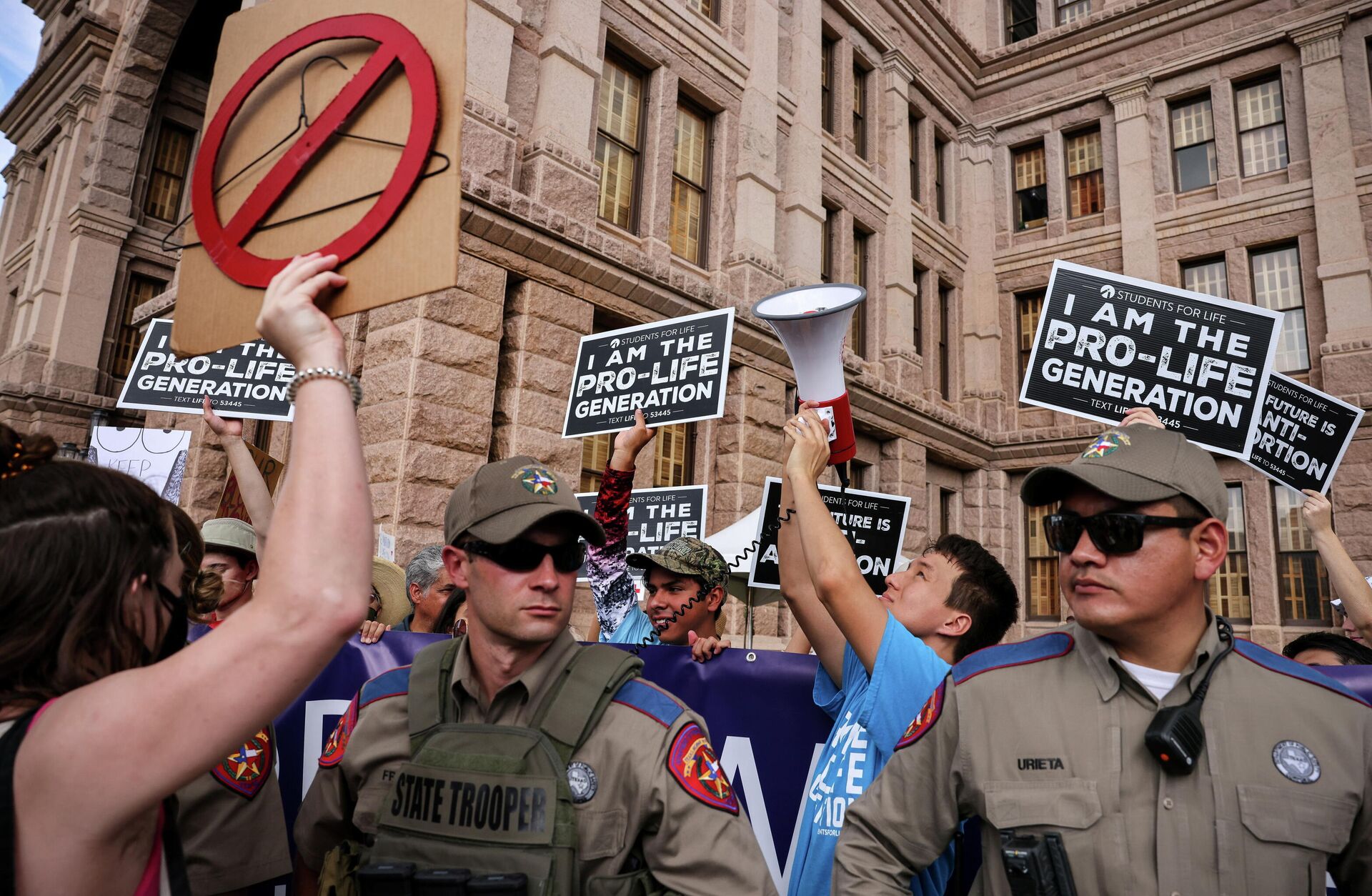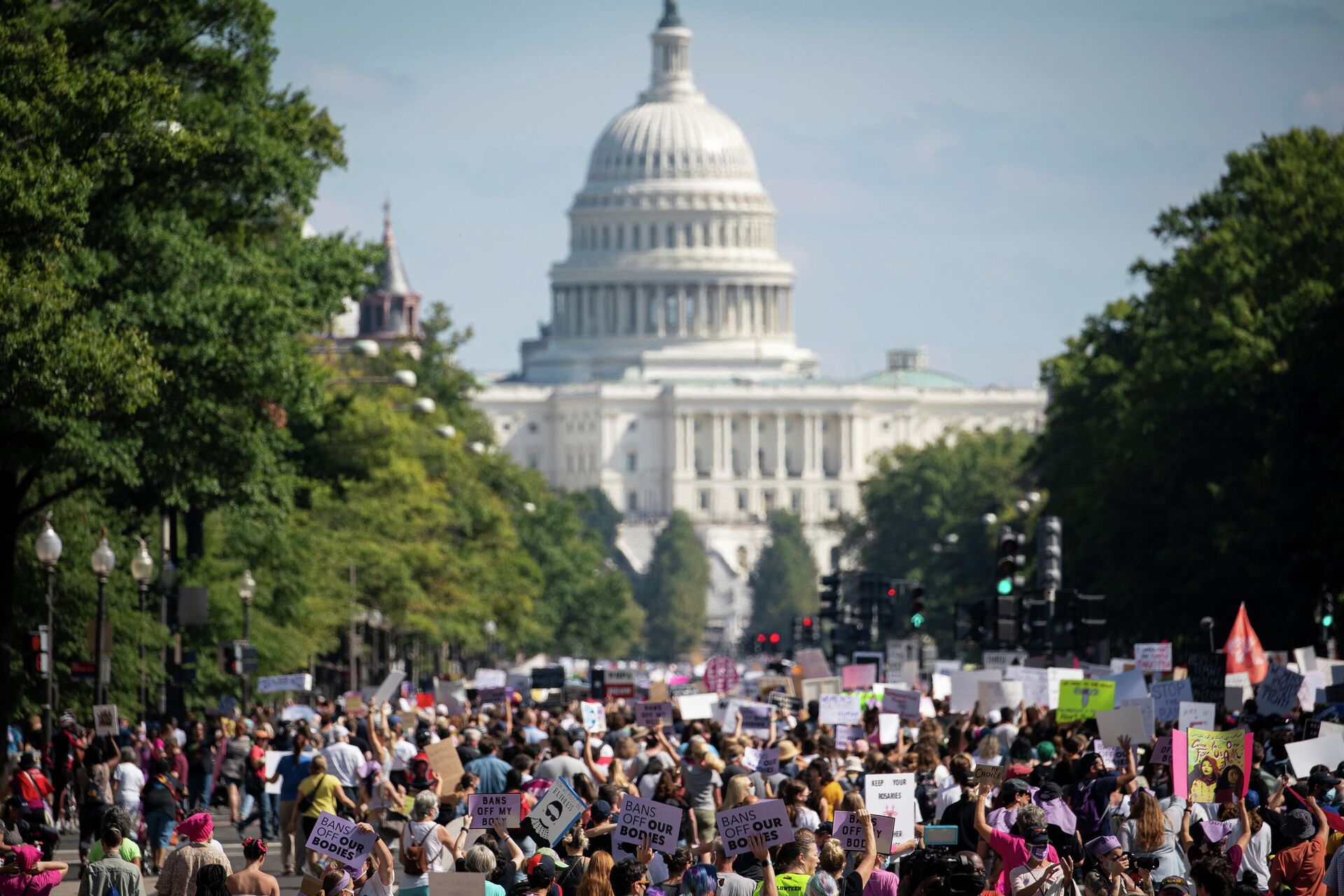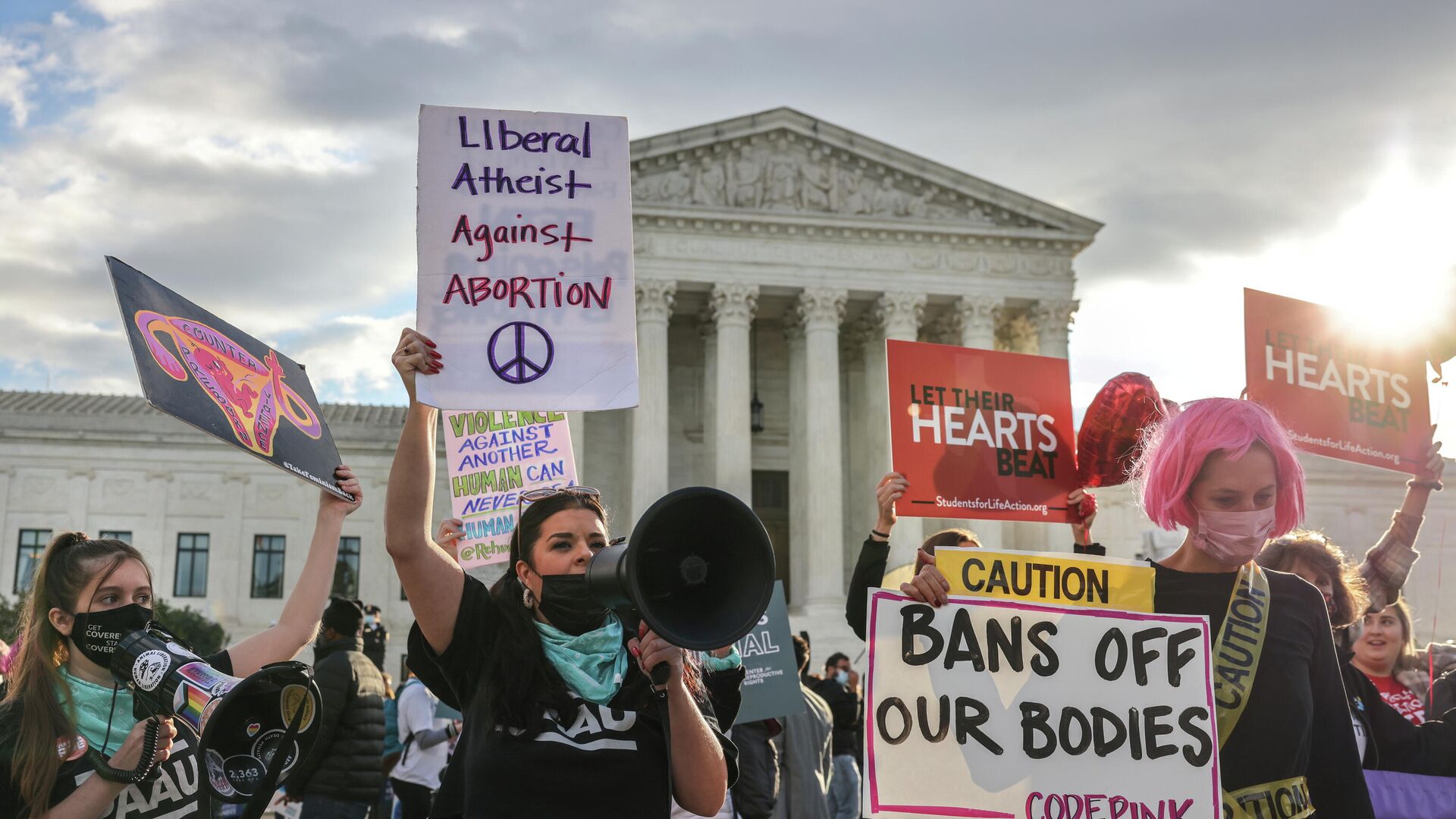'We Have No Authority': Texas Tells Supreme Court DOJ, Abortion Clinics Can't Sue Them Over New Law
20:29 GMT 01.11.2021 (Updated: 13:25 GMT 06.08.2022)
Subscribe
The high court heard two related arguments on Monday about whether the state of Texas can use private citizens to enforce its extremely restrictive anti-abortion law, SB 8, which has banned most abortions in the state and was designed to evade challenges to its legality.
The two hour-long arguments before the nine Supreme Court justices both concern the same topic but from different perspectives. One, Whole Woman’s Health vs. Jackson, brought by abortion providers in Texas, concerns “whether a state can insulate from federal court review a law that prohibits the exercise of a constitutional right by delegating to the general public the authority to enforce that prohibition through civil actions.”
The other, United States vs. Texas, is a challenge to the law by the US Department of Justice and seeks to answer whether the federal government may “bring suit in federal court and obtain injunctive or declaratory relief against the state, state court judges, state court clerks, other state officials or all private parties to prohibit SB 8 from being enforced.”
Texas Law Bans Majority of Abortions
Signed into law in April by Texas Governor Greg Abbott, SB 8 does something many laws have sought to do, but does it in a completely new way.
The law is a so-called “heartbeat law” that bans abortions about what opponents call a heartbeat in the embryo is capable of being detected. According to women’s health experts, what is being detected is not an embryonic heartbeat, but electrical signals being sent by a cluster of cells with the potential to develop into a heart, but which have not yet done so.
Those electrical signals are detectable as early as five or six weeks after conception, at a point that many women are not even aware they are pregnant. According to Planned Parenthood, approximately 85% to 90% of people who get abortions in Texas do so after 6 weeks of pregnancy.
The Texas Policy Evaluation Project at the University of Texas at Austin on Friday published data from the first month of the ban, which took effect on September 1. Their data found that just 2,164 abortions were performed in Texas between then and October 1. Compared to the previous month, August 2021, that was a 60% drop from 5,377; compared to the September 2020, which had 4,313 abortions, it was a 49.8% drop.

Texas police separate anti-abortion protestors from supporters of reproductive freedom during the nationwide Women's March, held after Texas rolled out a near-total ban on abortion procedures and access to abortion-inducing medications, in Austin, Texas, U.S., October 2, 2021.
© EVELYN HOCKSTEIN
Heartbeat bills are nothing new: 14 other states have passed such laws in the last three years, with federal courts striking down or suspending all of them as violations of the 1973 Roe vs. Wade ruling, which established the legal right to an abortion and laid out a framework for its regulation, including that abortions could not be restricted during the first 13 weeks of pregnancy.The most recent to be blocked was Oklahoma’s, which was set to take effect on Monday before the Oklahoma Supreme Court suspended it last week, pending the results of ongoing litigation.
Law Designed to Frustrate Legal Challenges
However, Texas’ SB 8 isn’t enforced in the traditional way laws are - in fact, the state is legally barred from doing so. Instead, it provides for third-parties to sue for damages those who “aid and abet” an abortion. The vaguely-worded law could open up a wide array of people for lawsuits, including doctors and staff at abortion clinics, but also, for example, someone who drives the abortion recipient to the clinic, all of whom can be hit with $10,000 fines under SB 8.
“The issues before this court are far more sweeping” than just the Texas law itself, Marc Hearron, a lawyer with the Center for Reproductive Rights, told the justices.
“To allow the Texas scheme to stand would provide a road map for other states to abrogate any decision of this court with which they disagree," he argued. "At issue here is nothing less than the supremacy of federal law.”
Texas Solicitor General Judd Stone, who defended the state against the abortion providers’ challenge, said both they and the DOJ had sued the wrong people, as Ken Paxton, the state’s attorney general, no longer had the power to stop private citizens from filing lawsuits under the law. Instead, he argued they should wait for someone to actually sue an abortion clinic in a state court and use that suit to adjudicate whether SB 8 is a valid law.
Justice Elena Kagan, one of three liberals on the high court and a strong critic of SB 8, pressed Stone on why Paxton could no longer halt the actions of litigious, anti-abortion Texans.
“If every private citizen here has been deputized by the state to enforce this law for the bounty, then why wouldn’t an injunction against the AG bar those citizens from going into court?” she asked.
Stone replied that the attorney generals’ office has “no control” over the actions of private individuals. “Unless this court were to say that private individuals are somehow agents, acting in concert with the attorney general,” Stone argued, “we have no authority over them.”
Battle Over Abortion Heats Up
Exactly one month after hearing the two cases on SB 8, the US Supreme Court will hear another case concerning a Mississippi anti-abortion law that could prove even more consequential.

Supporters of reproductive choice march to the U.S. Supreme Court during the nationwide Women's March, held after Texas rolled out a near-total ban on abortion procedures and access to abortion-inducing medications, in Washington, U.S., October 2, 2021
© REUTERS / ALEXANDER DRAGO
Dobbs vs. Jackson Women’s Health Organization will see the court weigh not just the Roe case, but also a later case that upheld Roe’s reasoning: Planned Parenthood vs. Casey (1992). The 2018 Mississippi law bans abortions after 15 weeks, and abortion advocates fear that because the high court’s conservative majority allowed Texas SB 8 to take effect, it may use the Dobbs case to strike down the right to an abortion entirely.
If that happens, so-called “trigger laws” in 12 US states dominated by Republican politics would automatically take effect, banning abortion in those states the moment it becomes legal for them to do so.
However, Democrats have also attempted to fight back by pushing a federal bill that would codify Roe v. Wade into US law. The Women’s Health Protection Act passed the Democrat-dominated House in September, but is unlikely to get through the Senate, where Republicans can use the filibuster to block it from ever coming to a vote.

